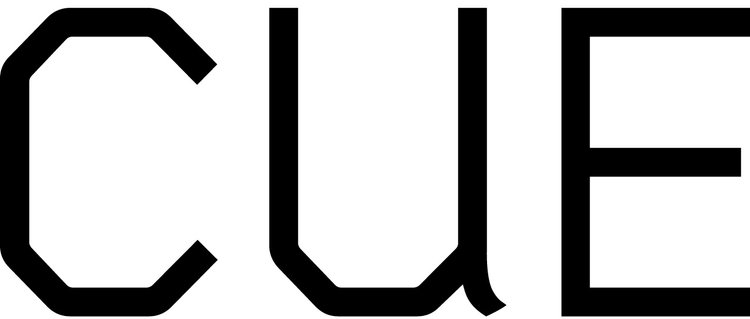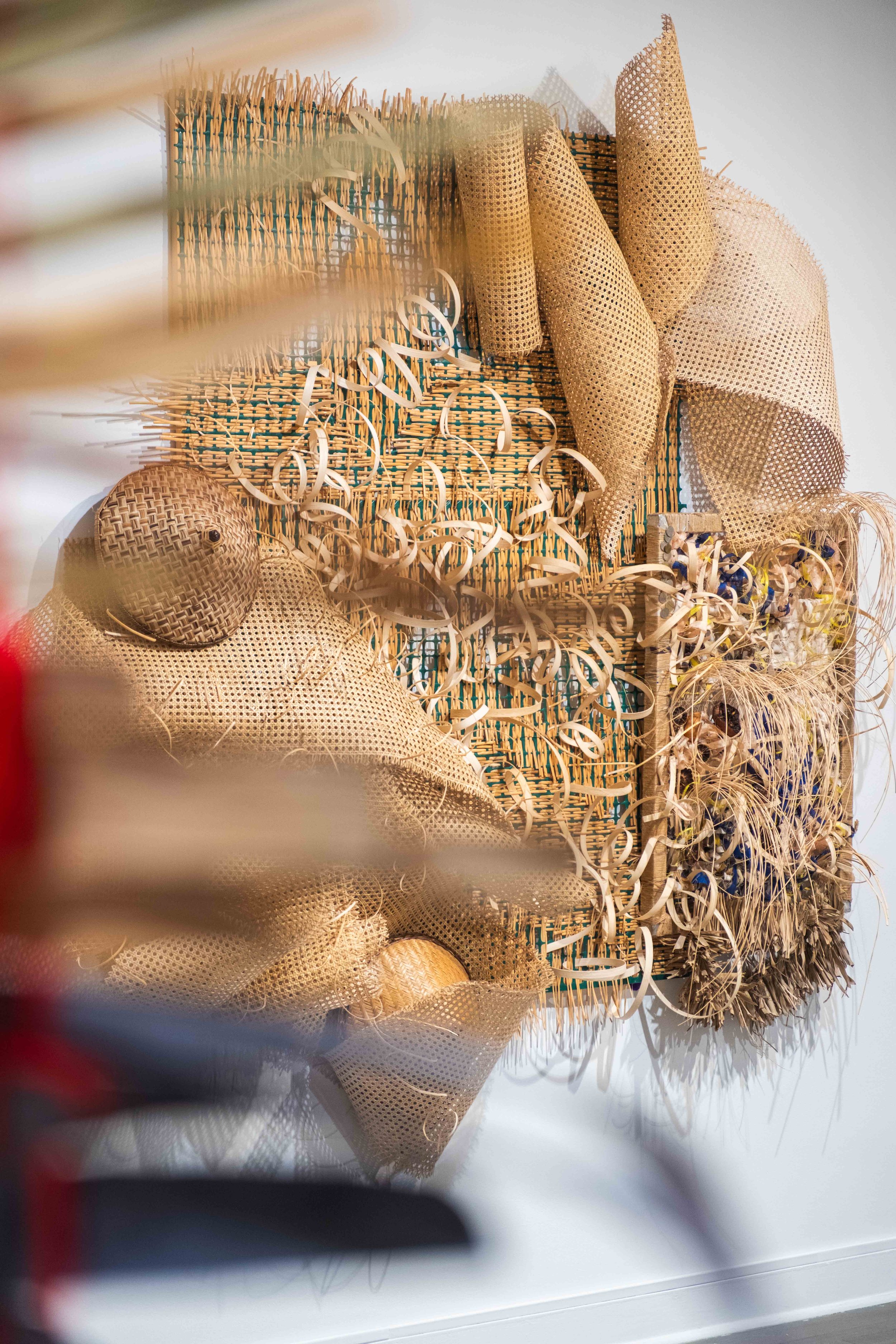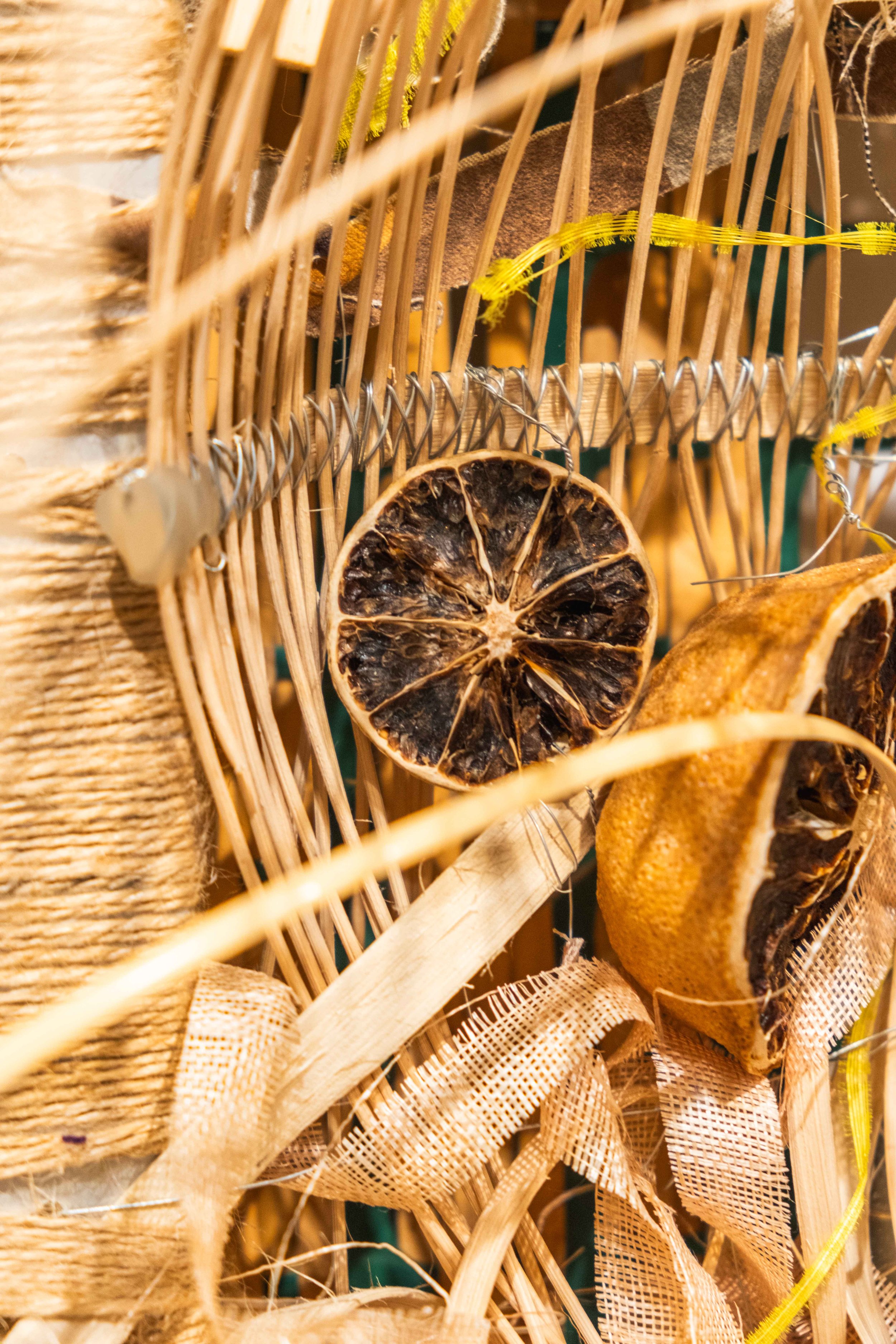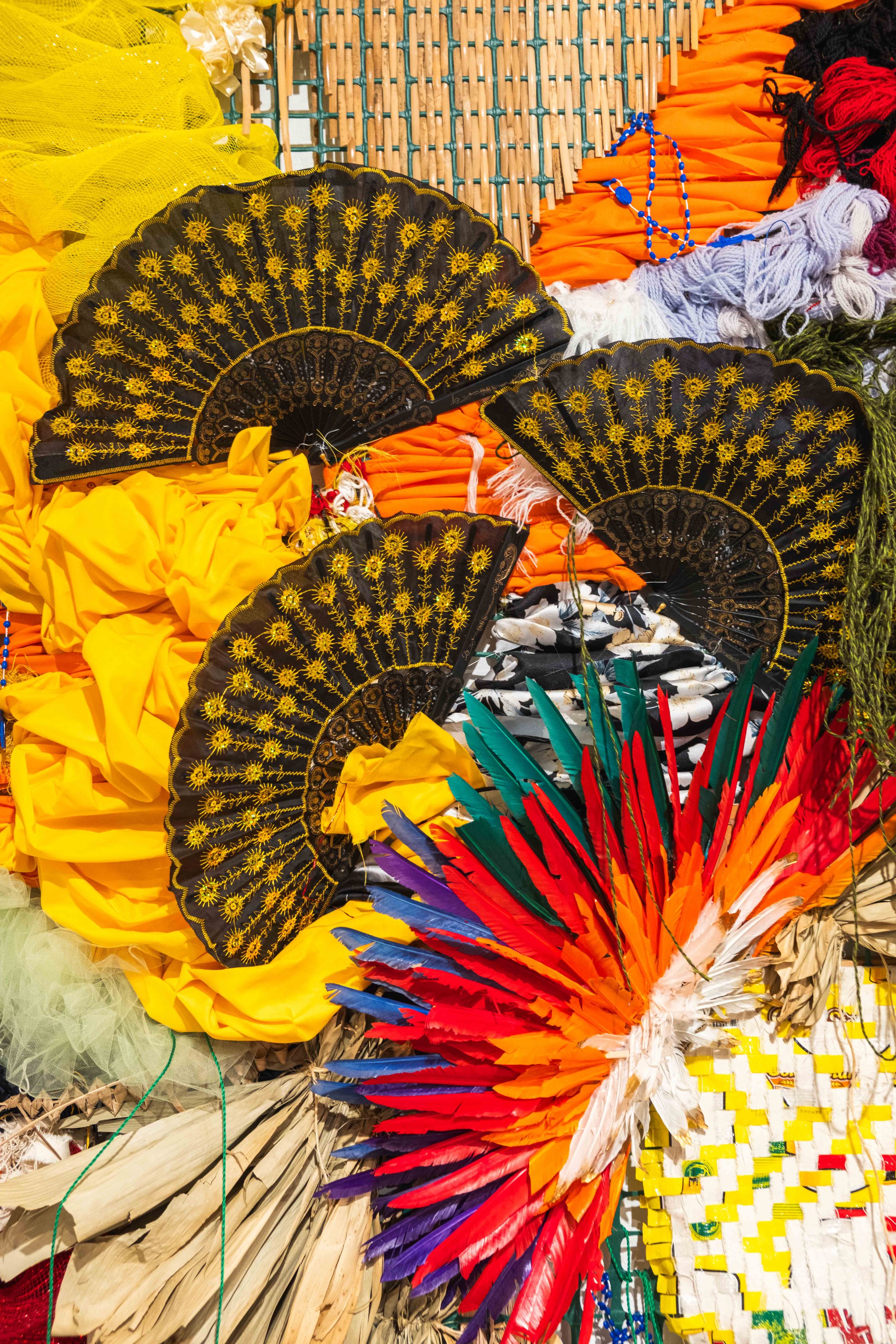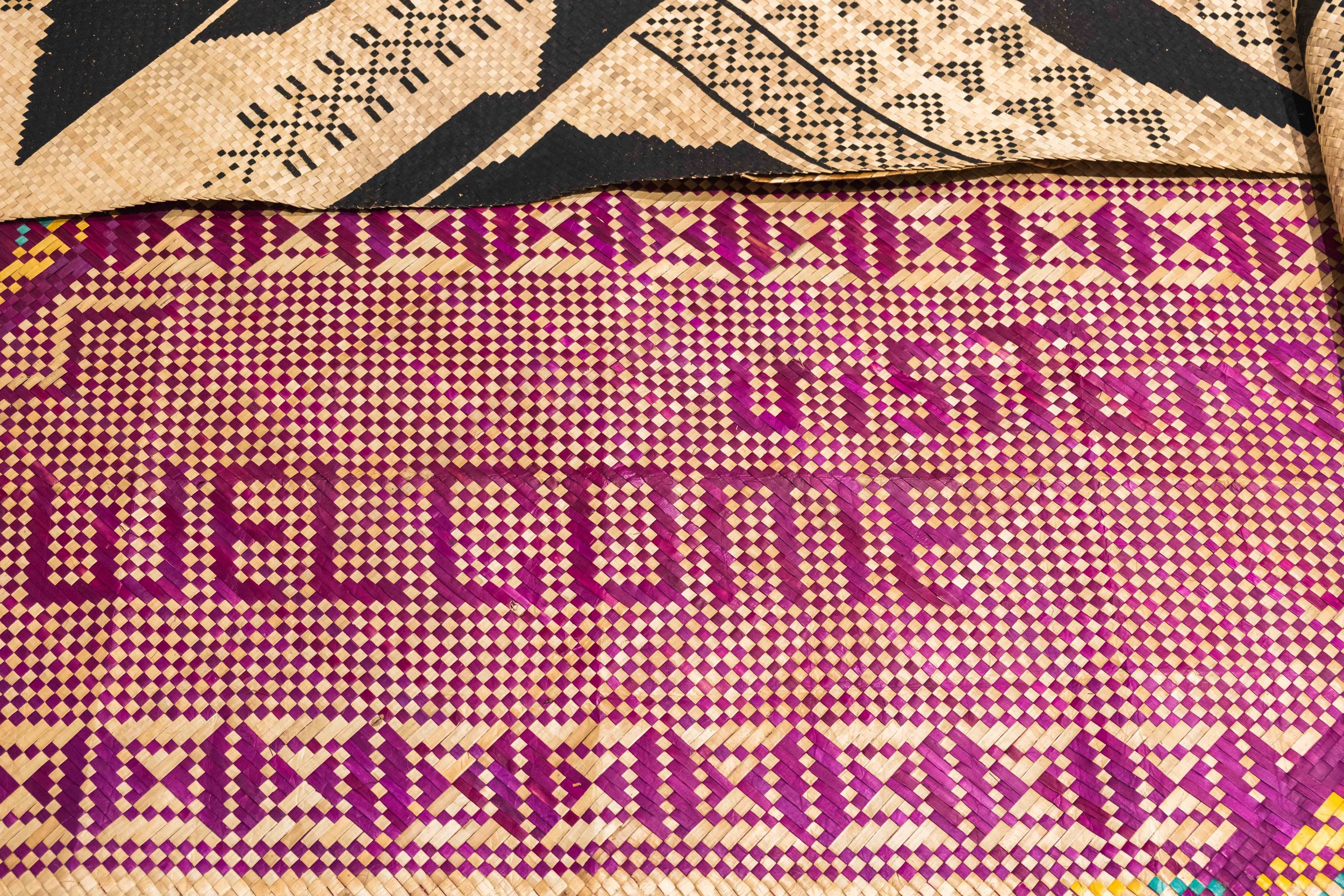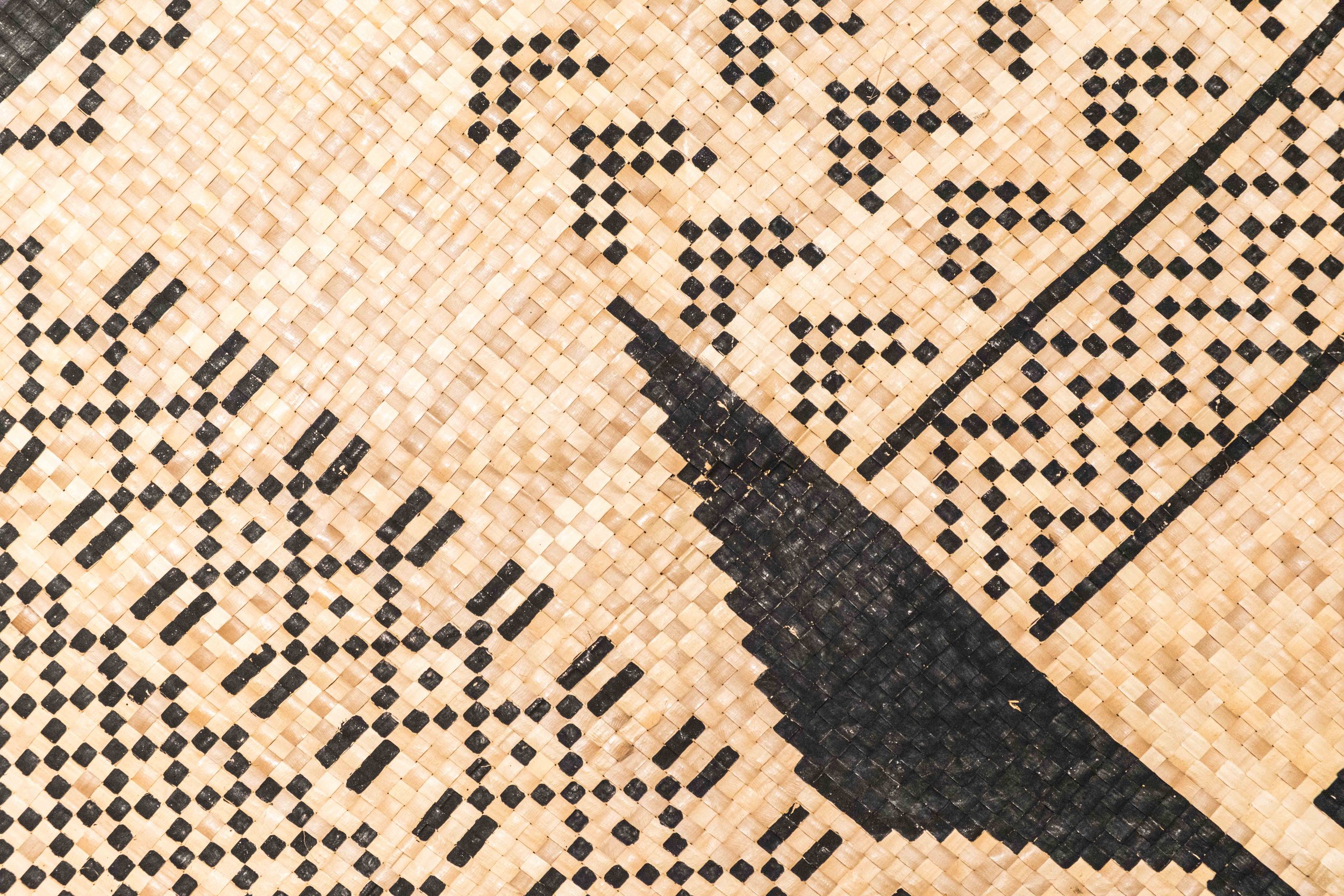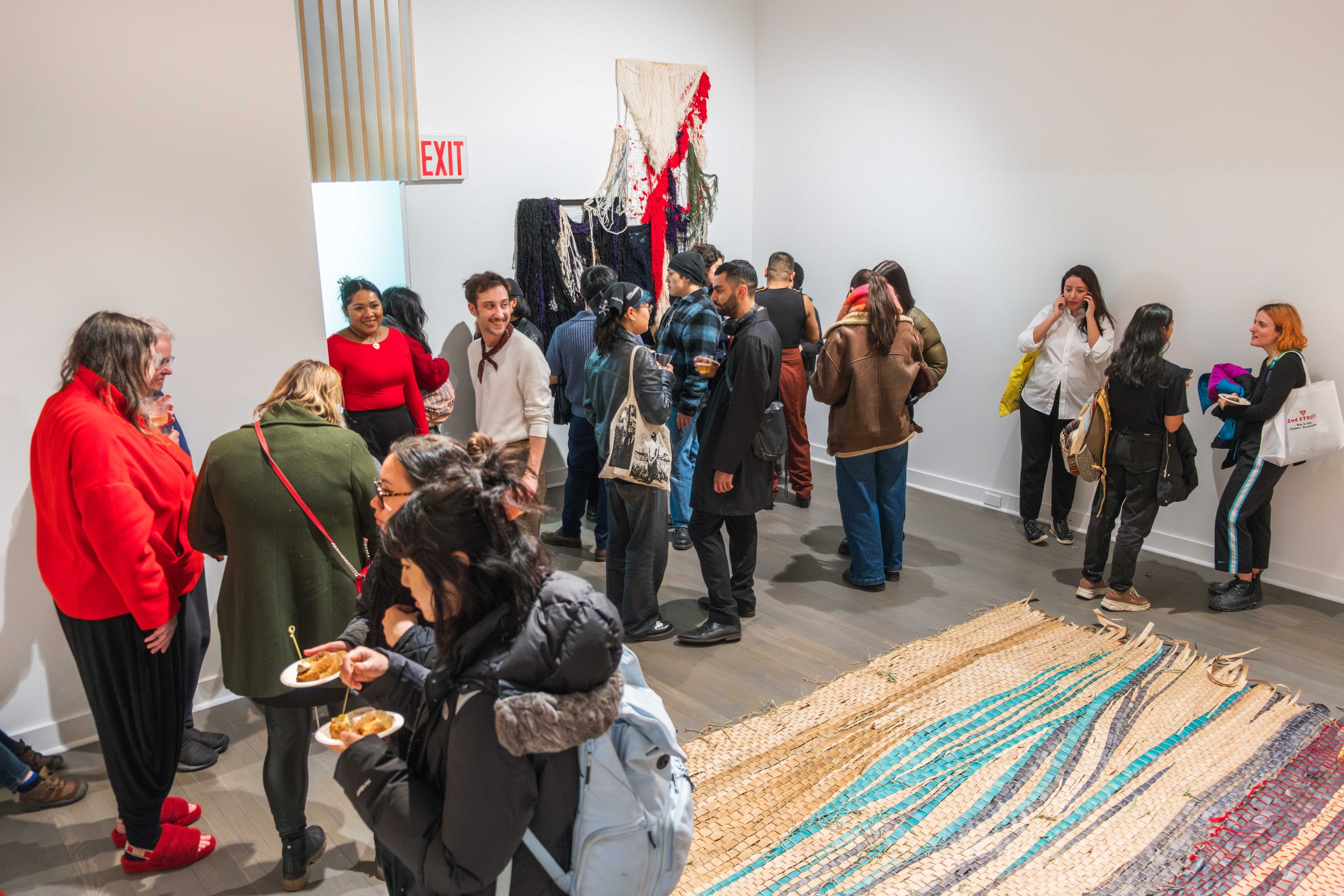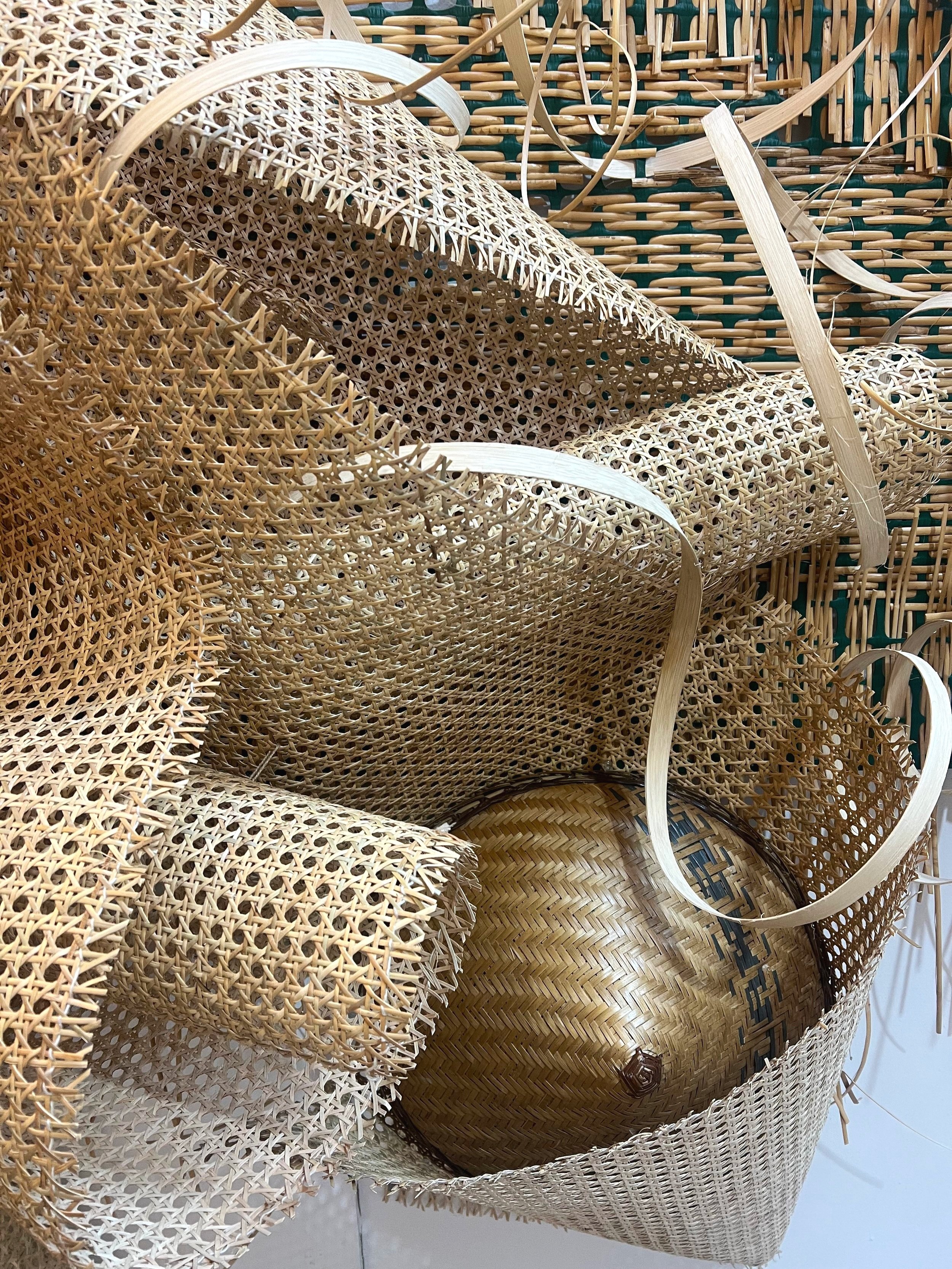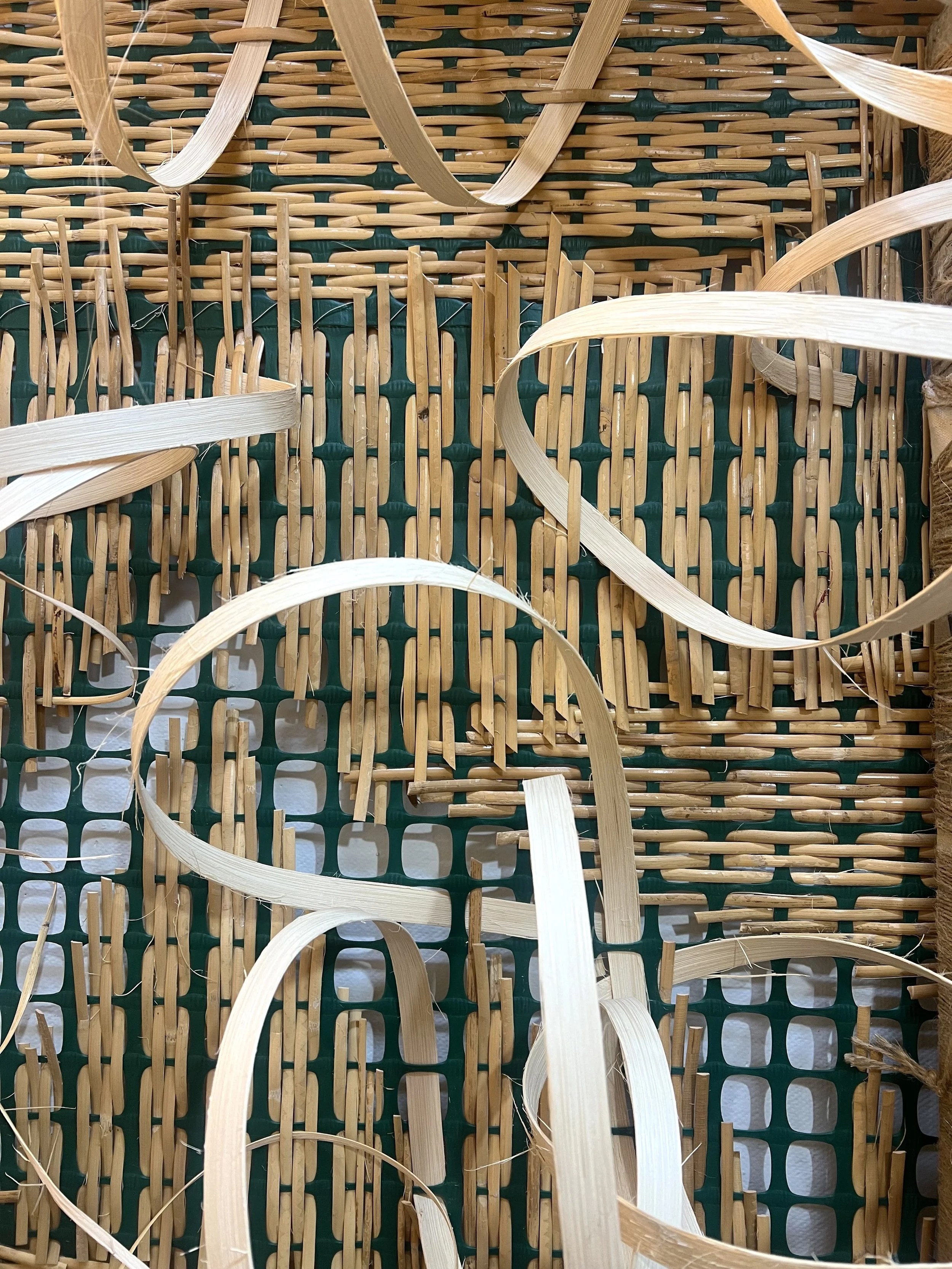Graphic design: Corinne Ang
Sometimes My Accent Slips Out by Bhen Alan
Mentor: Jade Yumang
With curatorial guidance from Jon Santos
April 4 – May 18, 2024
Wed–Sat, 12–6 pm
Opening Reception
Thursday, April 4th, 6–8 pm
Closing Event
A Kamayan Dinner + Banig Karaoke with Bhen Alan; dinner by Woldy Kusina
Wednesday, May 22nd, 6–11 pm
Sometimes My Accent Slips Out is a solo exhibition by Providence-based artist Bhen Alan with mentorship from Jade Yumang. The exhibition builds upon the artist’s ongoing investigation of the banig, an indigenous form of mat weaving in the Philippines that, for the artist, serves as a memory bank in the face of personal upheaval, new territories, and shifting cultural landscapes.
Sometimes My Accent Slips Out parallels the practice of mat weaving with the sociolinguistic impact of migration and personal transformation. Alan reflects upon his own ancestry, contemplating the significance of the banig to everyday life, spirituality, and culture in the Philippines. These mats—which are used for sleeping, eating, gathering, rest, and ritual—serve as extensions of the individual self and collective heritage, as objects that mediate birth and death, celebration and mourning. They serve as a material legacy of resilience and community, with their forms and techniques passed down from weaver to weaver despite centuries of colonization, globalization, and foreign imposition.
“Banig weaving does not start at the first fold of a reed over another, but with seeds that are planted and tended to until harvest [...] the banig is entwined in a natural cycle of living and dying that is essential to human and nonhuman survival, a stark contrast to the ‘destroy, extract, exploit’ approach to the land’s resources in much of the West,” writes catalogue essayist Sasha Cordingley. “Taken altogether, banig is not just object, but a stand-in for a Filipino identity, which has firmly resisted the steamrolling of culture, memory, and tradition by colonial enterprises.”
The banigs Alan creates are, in a sense, autobiographical. In emigrating from Cagayan Valley, Philippines to Canada and then to the United States, the artist struggled with his speech, compelled to code switch between accents and dialects in ways both subconscious and overt. Alan repositions the process of weaving as a proxy for this hybridity. In intertwining the material, the maker must balance the warp and weft of the mat, maintaining an even tension. In Alan’s banigs, he breaks and disrupts this grid, embracing inconsistencies and using his body as a loom. Pushing beyond tactile representations of identity, his practice is a testament to the dynamic craft of communication. Accent serves as the warp in the fabric of speech, influencing the texture and quality of spoken language. The desire to be understood and accepted within new communities often becomes a pursuit to countervail inherited accents with acquired ones. Alan rejects this notion. Working within an intricate grid, he embraces the errors and glitches that fracture its borders, and in the process, he creates new ways of seeing—and of embodying—what is in between.
Through these explorations, Sometimes My Accent Slips Out unravels the complicated legacies we navigate in an increasingly globalized world. Alan’s practice is a site of negotiation, a place of reconciliation between multiple cultural and social identities. He employs a variety of weaving techniques, presented in brightly-colored works that drape the gallery in palm, abaca, and coconut leaves from his homeland, interwoven with cattails and other materials from North America. Positioned alongside these large-scale works are banigs of pandan, tikog, and buri from his recent Fulbright fellowship fieldwork in the Philippines, during which he collaborated with weavers in various regions of the archipelago.
Sometimes My Accent Slips Out is a celebration of our multiplicities and a declaration of presence. Alan embraces a wholeness that uplifts the nuances of cultural legacy, and activates future narratives of tradition that may be carried through generations and across geographies.
About the Artist
Bhen Alan (b. 1993, Cagayan Valley, Philippines) is a visual artist, dancer, and educator who grew up weaving and learning traditional folk dances. He immigrated to Toronto, Canada, when he was 17 years old, before settling in the United States. He received U.S. citizenship in 2019. Alan’s work draws from his upbringing and diasporic experiences to incorporate multiple disciplines and mediums that reflect both his cultural heritage and recent contemporary investigations.
Alan holds an MFA in Painting and a Certificate in Collegiate Teaching in Art and Design from the Rhode Island School of Design, and a BFA in Painting from the University of Massachusetts, Dartmouth. From 2022-23, he received a Fulbright scholarship to conduct artistic research in the Philippines, working alongside master weavers of indigenous tribes to research mat weaving culture.
His work has been exhibited at the Museum of Fine Arts Boston (Boston, MA), Praise Shadow Gallery (Brookline, MA), Real Art Ways (Hartford, CT), 808 Gallery at Boston University (Boston, MA), Rhode Island School of Design (Providence, RI), Hunter Gallery (Middletown, RI), E.I.K. Gallery at Yale University (New Haven, CT), Culture Lab LIC (New York, NY), Providence Public Art Library (Providence, RI), St. Botolph Club Foundation (Boston, MA), John B. Aird Gallery (Toronto, Canada), Shockboxx Gallery (Hermosa Beach, CA), Providence Art Club (Providence, RI), Bowersock Gallery (Provincetown, MA), and New Bedford National Historical Park (New Bedford, MA), among many others.
About the Mentor
Jade Yumang (b. Quezon City, Philippines) grew up in Dubai, United Arab Emirates; immigrated to unceded Coast Salish territories in Vancouver, Canada; and currently lives in Chicago, IL, which sits on the traditional homelands of the people of the Council of Three Fires: the Ojibwe, Potawatomi, and Odawa, as well as the Menominee, Miami, and Ho-Chunk nations.
Jade received an MFA at Parsons School of Design with Departmental Honors in 2012 and a BFA Honors at the University of British Columbia in 2008. Jade has shown nationally and internationally in several museums and galleries, such as the Leslie-Lohman Museum of Art, the Brooklyn Museum, the John Michael Kohler Arts Center, the Museum of Arts and Design, Craft Contemporary, the Nerman Museum of Contemporary Art, the Des Moines Art Center, Western Exhibitions, and ONE Archives. Jade is a recipient of several grants from the Canada Council for the Arts and the BC Arts Council, and is an Associate Professor in the Department of Fiber and Material Studies at the School of the Art Institute of Chicago.
Exhibition Video
Exhibition Materials
Press Release
Click here to download a PDF version of the exhibition press release. For more info or press materials, email press@cueartfoundation.org.
Catalogue
Sometimes My Accent Slips Out is accompanied by an exhibition catalogue with texts by artist Bhen Alan, exhibition mentor Jade Yumang, and essayist Sasha Cordingley (mentored by Ana Tuazon as part of CUE’s Art Critic Mentorship Program). The catalogue is available to read online, and a print version is available free of charge to gallery visitors.
Sasha Cordingley’s catalogue essay, “In the Folds,” is available to read on our website.
Closing Event Photos
Installation Photos
Artwork Photos
Opening Reception Photos
Artwork Preview Photos
Exhibition Credits
Sometimes My Accent Slips Out by Bhen Alan, mentored by Jade Yumang. Curatorial guidance from Jon Santos. Catalogue essay by Sasha Cordingley, mentored by Ana Tuazon. Graphic design by Corinne Ang. Presented by CUE Art, 2024.
This exhibition was organized as part of CUE’s annual open call for solo exhibitions. Bhen Alan was awarded the opportunity to present a solo show during our 2024 season. For more information about the open call program, see here.
Support
Programmatic support for CUE Art is provided by Evercore, Inc; ING Group; The Milton and Sally Avery Arts Foundation; The William Talbott Hillman Foundation; and Corina Larkin & Nigel Dawn. Programs are also supported, in part, by public funds from the New York City Department of Cultural Affairs, in partnership with the City Council; the New York State Council on the Arts with the support of Governor Kathy Hochul and the New York State Legislature; and the National Endowment for the Arts.
